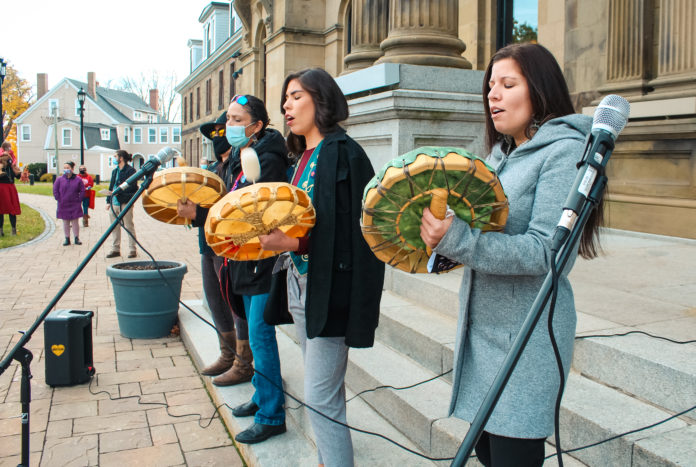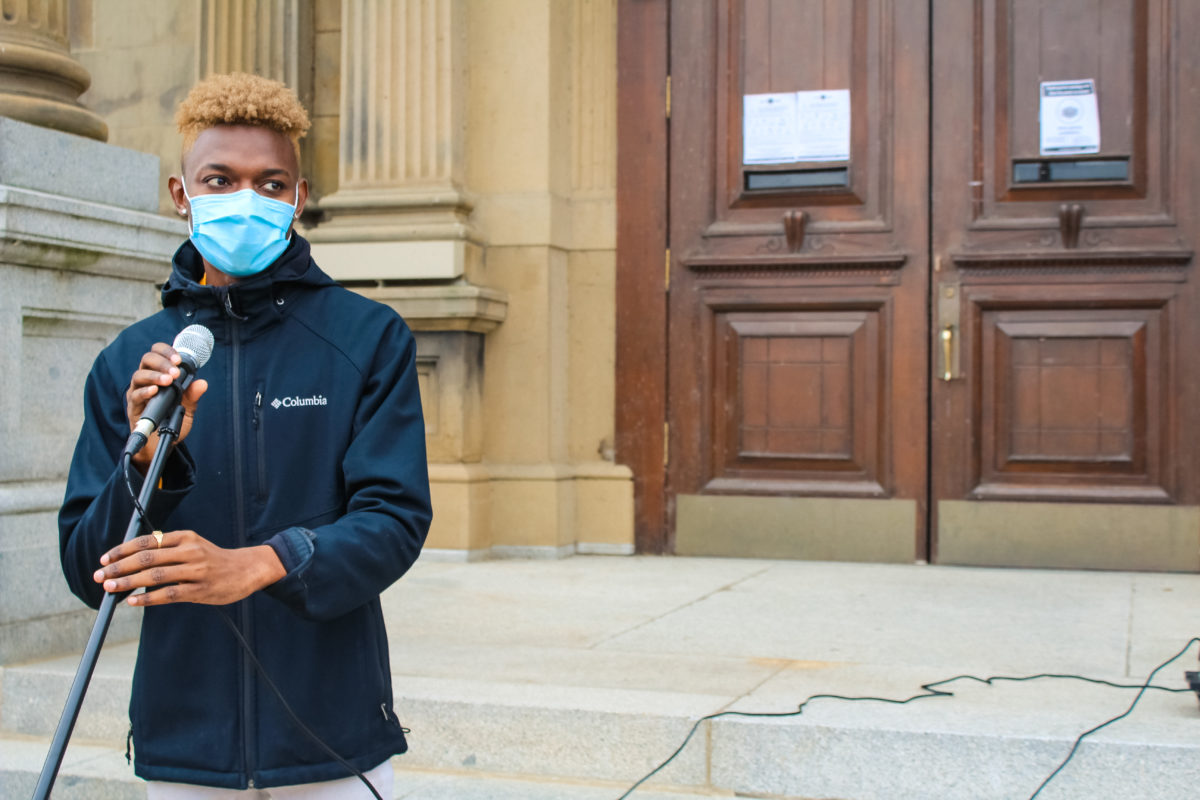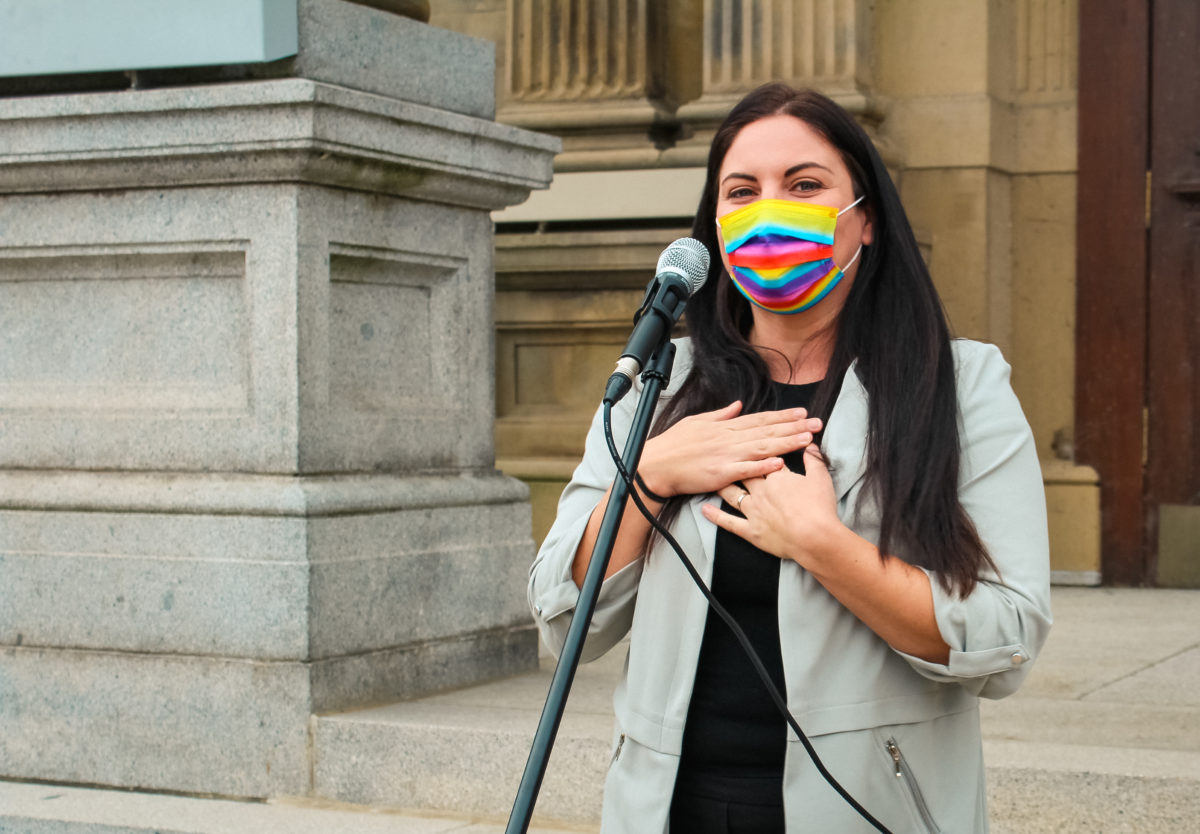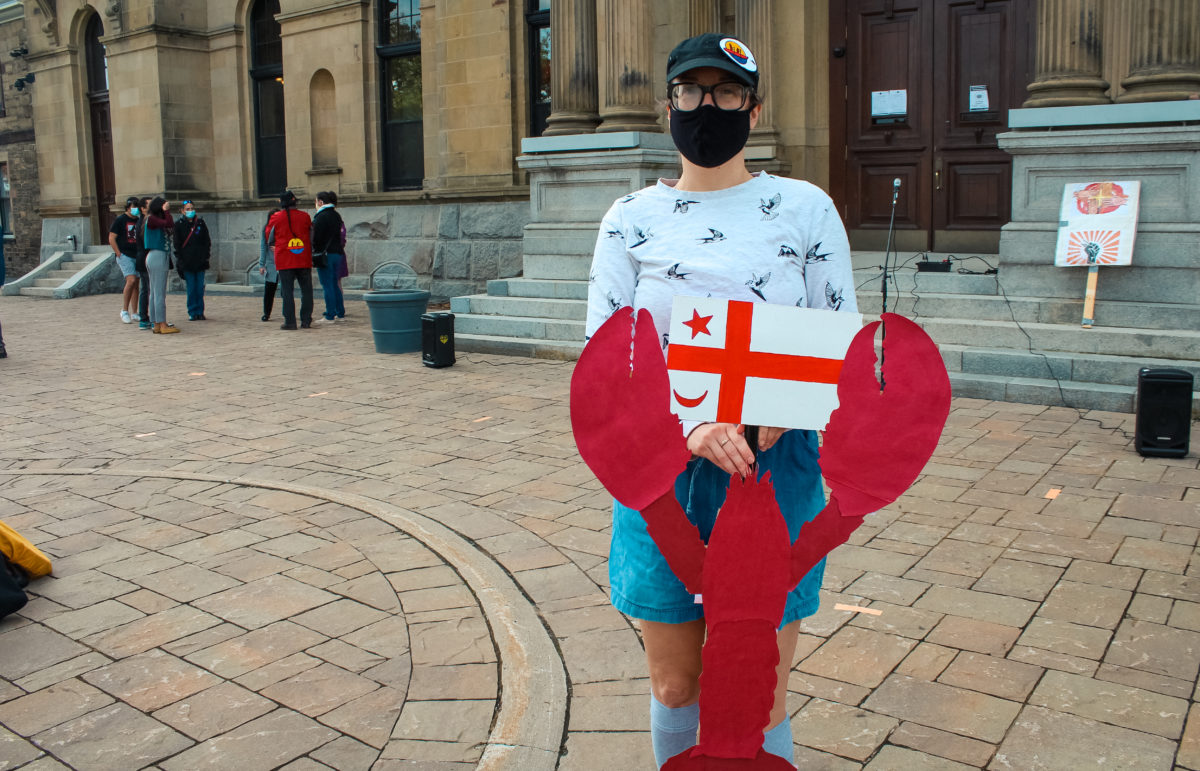
Alma Brooks, a Maliseet grandmother from St. Mary’s First Nation, addressed a crowd of 130 protestors at the Provincial Legislative Building on Oct. 22 with a message for the commercial fishermen in Saulnierville, Nova Scotia.
“I’d like to say to them, they should really try to go and learn how to read and write and educate themselves,” she said, met with laughter and applause.
“They shouldn’t just put all their eggs in one basket because unless you educate yourself, you just remain vulnerable to the suggestions of others.”
Black Lives Matter Fredericton organized a support rally for Mi’kmaq relatives in Nova Scotia in the Sipekne’katik district of Mi’kma’ki facing violence for their treaty right to fish for livelihood.
What happened on St. Mary’s Bay
The tension between Indigenous and commercial fishermen began in late August. Treaty 1752 allows Indigenous Peoples to fish lobster for their livelihood outside of regular season.
The treaty also states Indigenous Peoples have a right to a moderate livelihood, which came from the Supreme Court of Canada’s Marshall decision in 1999.
Read more: Tensions rise between Indigenous and commercial fishermen
A few months later, the Supreme Court clarified their decision and said the federal government can still regulate Indigenous fisheries if conservation became an issue. But there was never a clear definition of what moderate livelihood means.
On Oct. 13, commercial fishermen stormed two Mi’kmaq lobster facilities. Threats were launched, a van was set on fire and hundreds of lobsters were stolen.
On Oct. 17, more vandalism occurred in southwest Nova Scotia when a fire broke out at a lobster pound and it burnt to the ground, sending one man to hospital with life-threatening injuries, according to CBC.
Fredericton joins the fight

Husoni Raymond, a Black Lives Matter Fredericton organizer and former St. Thomas University Students’ Union president, spoke at the protest and said Black Lives Matter Fredericton is honoured to stand with the Mi’kmaq nation.
“We support the Mi’kmaq inherent right to fish, as their ancestors have been doing for centuries,” said Raymond in a speech. “We’ll continue to stand up for Indigenous sovereignty and self-determination because we know there will be no Black liberation on stolen land and our interests are interconnected.”
Jenica Atwin, Fredericton MP, also attended the protest and spoke to the crowd.
Atwin said when the conflict in N.S. first started, she asked Bernadette Jordan, Minister of Fisheries, Oceans and the Canadian Coast Guard, how she was going to uphold treaty rights and ensure the protection of the Mi’kmaq fishermen. Atwin said Jordan promised safety on all sides, but Atwin didn’t believe her and instead challenged her at a House of Commons emergency meeting on Oct. 1.
“I showed up that night to the House of Commons to debate Minister Jordan on this a month ago,” Atwin said. “And she didn’t show up. She sent her parliamentary secretary with a prepared statement.”
Atwin said Jordan didn’t take into account any of the words she had prepared.

Atwin said she’s been criticized for standing up for Treaty 1752 as a Green MP. She said people are ashamed of her for not standing up for conservation and preserving resources.
“And I tell them, ‘you want to talk conservation, let’s talk Clearwater.’”
Clearwater Seafoods, a Canadian seafood giant, has multiple infractions of conservation issues, said Atwin. She said they’ve left traps on the bottom of the ocean for months leaving lobsters to die.
“I will continue to fight hard on your behalf,” said Atwin.
Sarah Kohut, STUSU president, attended the protest and said the event saw people coming together from all walks of life. She said it’s important to stand in solidarity as an ally of Indigenous Peoples.
“Indigenous Peoples in Canada have not been afforded their true rights for a very long time,” said Kohut. “I think it’s important that we rectify a situation that was made so wrong since day one.”

Amanda Myran, one of the organizers and master of ceremonies at the event, said treaties have been reinterpreted in ways that don’t benefit Indigenous Peoples.
Myran, who is Dakota Sioux but born and raised in Wolastoqey territory said what is happening to the Mi’kmaq on St. Mary’s Bay who are fighting to protect their treaty right is an Indigenous and non-Indigenous issue.
“All Canadians have a responsibility to uphold the spirit and intent of the treaties.”
Myran was part of the group of women who sang the Mi’kmaq honour song translated in Wolastoqey with their hand drums.
She said it was important to see so many people at the rally given that Canada is a country because of its treaties and those treaties need to be honoured.
“We needed to come together to reaffirm that we are all treaty people.”
